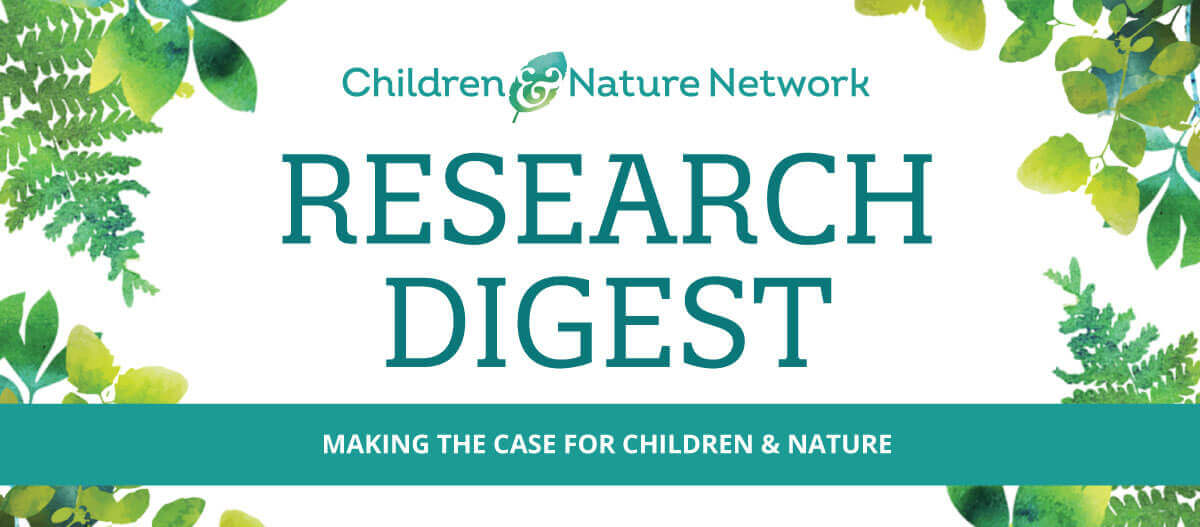MENTORING WITHIN FAMILIES
Most of the research on mentoring within families focuses on adults serving as mentors or role models to their children. Some of this research, however, speaks to how children and parents influence each other. Some of this research also expands the role of parents or guardians from focusing primarily on pro-environmental attitudes and behaviors to include the importance of helping children cope with environmental loss. Current investigations into how parents influence their children’s nature connectedness support earlier findings showing that what parents do is more influential than what parents say.
Parents and children influence each other in taking action for the environment
The 21 papers included in this literature review representing several different countries, all published since 2000, focused on adolescents in the context of environmentalism in the family. While most studies considered the influence of parents on children, a few studies found that children influence parents too. Parents’ behaviors had a greater influence on children’s environmental behaviors than the rules that parents establish. Culture and parenting styles influenced how and to what extent children influenced their parents.
Aghayeeabianeh & Talebi, 2020. Environmentalism in families.
Access Study
The Parental Self-Efficacy (NCPSE) scale may be helpful in assessing parents’ feelings of competence in promoting children’s nature connectedness
This research was based on the understanding that while parents play an important role in connecting their children with nature, some parents may not feel competent in doing so. Researchers in the U.K. addressed this concern by developing and validating a tool to measure parents’ feeling of competency in engaging their children with nature. This tool may be helpful to environmental professionals, researchers, policy makers and organizations working to promote families’ connectedness to and engagement with nature.
Barnes et al., 2021. Development and testing of the Nature Connectedness Parental Self-Efficacy (NCPSE) scale.
Access Study
Parents play an important role in promoting children’s connection with nature and helping them cope with environmental loss
This research focused on two parallel streams of research addressing young people’s feelings of connection with nature – one on nature connection as a primarily positive experience, the other examining loss as a painful side of connection with nature. Both areas speak to the importance of parents and other adults in promoting childhood nature connection and constructive hope. This research calls for the integration of research on connection with nature and coping with environmental change.
Chawla, 2020. Childhood nature connection and constructive hope: A review of research on connecting with nature and coping with environmental loss.
Access Study
Mothers’ environmental attitudes and behaviors predict how their children will relate to nature when they become young adults
This study collected data from 74 individuals in the U.S. when they were 6 years of age and again when they were 18. At age 6, information collected related to both child and mother; at age 18, just the young adult. Both times included measures of environmental attitudes and behaviors. Findings showed that the young adults who grew up with mothers who had more pro-environmental behaviors and attitudes behaved in a more pro-environmental manner themselves.
Evans, Otto & Kaiser, 2018. Childhood origins of young adult environmental behavior.
Access Study
Parents, as well as nature itself, help to shape a child’s ecological identity
This study examined the role of both parents and nature in the development of a child’s ecological identity. Drawing on journal entries composed by a parent/researcher in British Columbia, a young child’s exploration of a river is considered within a discussion of both the parent and nature as key contributors to a child’s ecological identity. The study offers implications for environmental education, especially in regard to parents working with nature as educators for a child.
Humphreys & Blenkinsop, 2018. Ecological identity, empathy, and experiential learning: A young child’s exploration of a nearby river.
Access Study
Eco-parenting promotes climate change mitigation and adaptation capacities in children
Researchers in Nigeria present a theoretical consideration of the role of eco-parenting, a form of ecological education, in building climate change mitigation and adaptation capacities in children. The discussion highlights the authoritative parenting style, a child-centered approach through which eco-parenting can instill environmental ethics and model pro-environmental behavior. Initiatives to educate parents on ecological issues are imperative to supporting eco-parenting and will give children opportunities to practice climate friendly behaviors.
Nche, Achunike & Okoli, 2019. From climate change victims to climate change actors: The role of eco-parenting in building mitigation and adaptation capacities in children.
Access Study
Children’s nature connectedness is strongly associated with parents’ connection to nature
Researchers analyzed data from 209 U.K. children and their parent/guardian to investigate factors associated with children’s nature connectedness. Of all variables considered, including frequency of nature visits, an adult with high nature connectedness in the same household was the strongest predictor of children’s nature connectedness. The study highlights the vital role parents/guardians play in nurturing children’s nature connectedness and calls for policies and programs that support nature connectedness among adults who are influential in children’s lives.
Passmore et al., 2020. Parental/guardians’ connection to nature better predicts children’s nature connectedness than visits or area-level characteristics.
Access Study
Children with family members who have negative attitudes towards nature are likely to exhibit biophobia
A study involving over 5000 fifth- and sixth-grade students from Japan documented the role of adult family members in children’s negative attitudes towards nature, or “biophobia.” Surveys completed by children assessed their attitudes towards invertebrates (insects and spiders) which were compared to their reports of family members’ attitudes towards invertebrates. Children whose adult family members had negative attitudes about invertebrates, including dislike, disgust, fear and perceived danger, were likely to have negative attitudes themselves.
Soga et al., 2020. How can we mitigate against increasing biophobia among children during the extinction of experience?
Access Study





 How do we inspire the next generation of nature champions?
How do we inspire the next generation of nature champions? 
